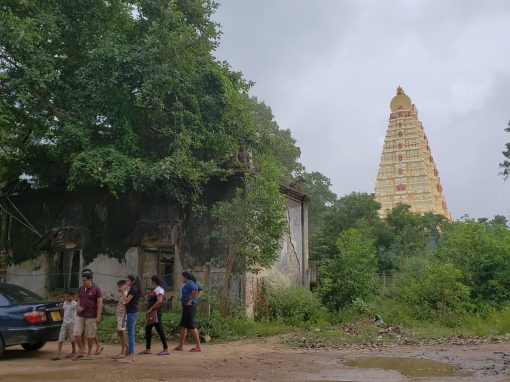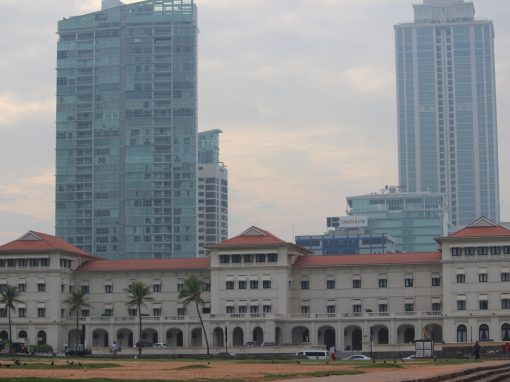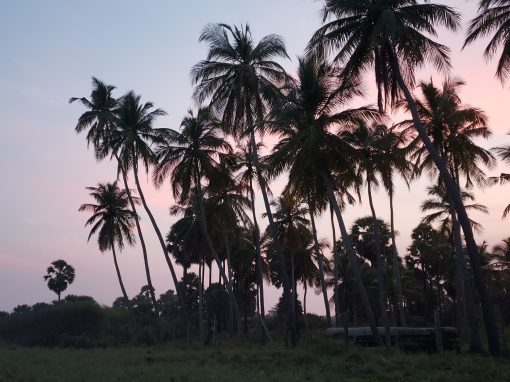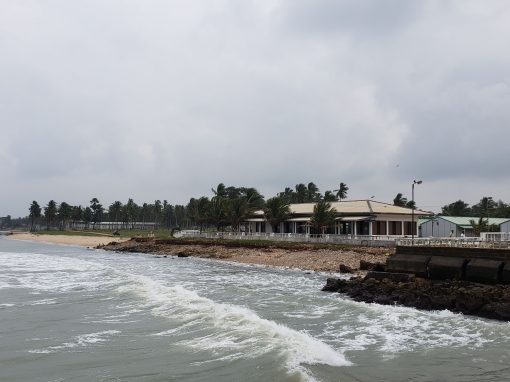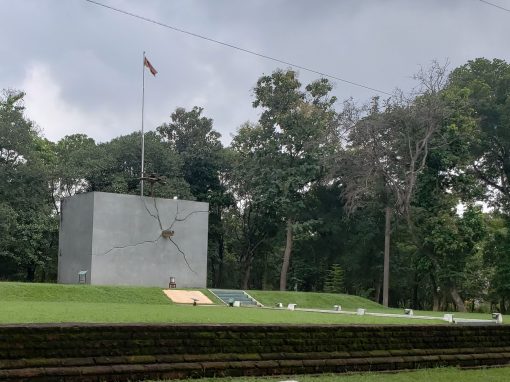Tamil-Canadians
Many Tamil-Canadians are located within the Greater Toronto Area. Pictured here is the front entrance of downtown Queen’s Park. (Photo © Stephen Cook)
“It’s great to be back for Tamilfest again this year,” Justin Trudeau told the gathered crowd in late August 2017. Although this time he was more than just the leader of a party: now he was Prime Minister.
“I’m told we’re expecting over 200,000 people this weekend, which is amazing,” he said before noting the contributions of the Tamil community to Canada. And now, thanks to motion 24, every January was now officially Tamil Appreciation Month.
But then he moved to darker topics, back to summer 2009, when international eyes turned to Sri Lanka as its war ended in slaughter and Tamils clamored to escape the aftermath, some even making their way to Canada.
“Their experiences remind us that although war is over, long-term peace has yet to be reached on the island,” Trudeau said. “Canada has long-called for a process of accountability that will have the trust and confidence of the victims of the war in Sri Lanka. As a society, as a Global community, we need to work together for greater rule of law and a greater respect for human rights.”
According to most estimates, there are now somewhere between 200,000 and 300,000 Tamil-Canadians, most living in the suburbs of Greater Toronto. In the last decade, it has become a voting bloc courted by all three parties but, like many diasporic communities, Tamil-Canadians carry with them the politics of their homeland.
That dynamic became apparent again in October 2018 when Sri Lanka President Maithripala Sirisena triggered a Constitutional Crisis by proroguing parliament and sacking Prime Minister Ranil Wickremesinghe. He attempted to replace him with Mahinda Rajapaksa, the former president whose regime oversaw the end of the civil war and was accused of widespread human rights abuses against Tamil civilians. Sirisena defeated Rajapaksa in 2015, running on a platform promising reform.
Canada, along with much of the international community, responded on Oct. 29 with a statement calling on Sirisena to re-establish the legislative body.
In the still-functioning Canadian Parliament, two long-time proponents of transitional justice in Sri Lanka once again raised their voices to direct the government toward the crisis.
One was Gary Anandasangaree, the Liberal MP for Scarborough-Park Rouge who was among the first Tamil refugees to arrive in Canada in the 1980s. In 2015, he ousted the first Tamil-Canadian MP, New Democrat Rathika Sitsabaiesan.
On Oct. 29, Anandasangaree brought the issue before the House of Commons during member statements.
“The international community must be seized of the issue,” began his speech’s conclusion, “and ensure that Sri Lanka abides by international norms and is in line – ”
Speaker Geoff Regan interrupted when Anandasangaree’s five minutes were up.
Anandasangaree maintains the current government has been effective in its messaging regarding accountability in the country.
“The way Canada can play a role is to release those statements and maintain a strong stance towards Sri Lanka and accountability,” he said, adding that “of any world leader our Prime Minister has been the most consistent.”
But Garnett Genuis, Conservative MP for Sherwood Park-Fort Saskatchewan and Shadow Deputy Foreign Minister, has repeatedly laid criticism at the Liberals for inaction towards Sri Lanka. And at the onset of the constitutional crisis, he did so again.
“The government has somethings to say about it but I think it’s important for us to be speaking out about the particulars of the situation,” he said by phone. “But I think also we should be dusting off the Magnitsky sanctions tool, making clear to those involved in serious human rights abuses … that they should be held accountable and if that accountability isn’t happening domestically it will happen in the context of international sanctions targeted against individuals.”
Allowing Sri Lankan military members to attend a 2017 peacekeeping conference in Vancouver exemplified such words without deeds, according to Genuis. A Privileges and Immunities Order was issued in the Canada Gazette ahead of the conference, although it did not specific any nation.
Genuis has also been critical of the government’s decision to shut down the previous administration’s Office of Religious Freedoms, which was operating on the island nation.
The Harper years marked a remarkable shift in policy toward not only Sri Lanka but the Tamil diaspora, in no small part due to the end of the conflict. Steven Seligman, a professor of political science at Dalhousie, divides the relationship into three distinct time periods: 2006-2009, 2009-2011, and 2011-2015.
In 2006 the Liberation Tigers of Tamil Eelam was officially recognized as a terrorist organization within Canada after years of relative impunity. It is important to note that the LTTE and the diaspora are not one in the same but the framing of the nationalist aspirations of the community within the War on Terror was both a spiritual and financial blow to the movement.
When the war finally ended in 2009, international observers made credible claims that many innocent civilians had been victims of war crimes during the final push. In major centres of the Tamil diaspora, including Toronto and London, England, protestors took to the streets in droves. At one point 10,000 people demonstrated on Parliament Hill.
Representatives from both opposition parties addressed the crowd in Ottawa but no Conservative ever did.
It was in the period that followed when the Conservatives began courting the “ethnic” vote, as detailed in a leaked email from the office of then-immigration minister Jason Kenney.
In 2013, Harper made himself out to be a vocal proponent of transitional justice in Sri Lanka by boycotting a Commonwealth summit in Colombo.
“This is a decision the Commonwealth has made and the Commonwealth will have to live with it,” he told media outlets at the time.
But despite these overtures, those Tamil-heavy suburbs did not turn blue, many of them remaining or returning to Liberal strongholds. In Anandasangaree’s riding, conservatives actually lost 4 percentage points between 2011 and 2014.
Amanarth Amarasingam, a researcher who has written extensively on the Tamil diaspora community (of which he is a member), says he sees a shift from lobbying to active political campaigning within the community.
“There was also a move post-2009 to say we took to the streets, we thought the Western governments including Canada were going to stop the war,” he explained. “Nothing really happened and therefore there’s been a real move now to enter mainstream politics as well.”
While Canada’s messaging regarding the constitutional crisis has satisfied the community, the country’s track record – under Trudeau, Harper, and even their predecessors – has left a “mixed” impression, according to Amarasingam.
“I guess it’s more which political party you belong to because there’s a lot of members of the Tamil community who felt like the liberal party basically sold them out, have taken their support for granted, because the Tamil community majority of us would vote for the Liberal party from the 80s onwards but there’s been a significant move lately to get people elected in the conservative party.”
“I think the diaspora’s sort of turned inwards and looking at the community’s future here.”
More Tamil youth, the sons and daughters of those original refugees, have taken to addressing the situation in Sri Lanka through development programs and NGO work rather than lobbying.
But the political lobbying is not gone. In an echo of Harper’s 2013 boycott, the Canadian Tamil Congress – the largest group of its kind – called for direct action through the Commonwealth in response to Sirisena’s actions.
“The Canadian Tamil Congress urges the Canadian government to take immediate steps to suspend Sri Lanka’s membership in the Commonwealth of Nations,” read a statement issued Nov. 9.
Two days later, Global Affairs released a statement without any mention of the Commonwealth.
“Sri Lanka’s democratic future is at stake,” it read. “Canada reiterates the importance of upholding the constitution and calls on all parties to refrain from violence and on law enforcement to act with restraint. The rule of law must be respected.”
The Constitutional Crisis ended in December 2018 when Sisrisena’s move to replace Wickremesinghe was declared illegal by the Sri Lankan Supreme Court. But Canada has continued to offer words, if not actions.
On Feb. 25, Liberal MP John McKay of Scarborough-Guildwood requested unanimous consent for a motion demanding Sri Lanka implement its obligation under a 2015 UN human rights council resolution to set a clear timeline for reconciliatory measures.
It did not pass.
